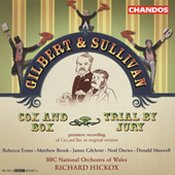Cox and Box, which is billed as “a Triumviretta,” is a trifle designed as such. This recording replaces the dialogue with narration for Sergeant Bouncer. While Donald Maxwell handles it well, the dialogue would be nice. The plot, such as it is, involves Bouncer letting a flat to two men simultaneously, one (Box) who works at night and sleeps during the day, and one (Cox) who works opposite hours. The problem is solved through predicable complexities that result in the discovery that the two men are brothers. All live happily ever after, joining in Bouncer’s recurring chorus of “Rataplan.” (He is formerly of the Dampshire Yeomanry, seemingly by way of the chorus to La Fille du Regiment.)
The score is a sly pastiche of several recognizable styles. Bouncer’s opening aria, as the excellent booklet notes by David Russell Hulme inform us, is a parody of Handle’s heroic style, and other operatic styles are parodied in several arias. Sullivan also got effect, not to mention double duty, from setting several arias in the style of popular parlor songs of the era. Box’s lullaby to his morning bacon, for instance, was published separately as a song, although with different words. (Tenor James Gilchrist’s performance of this lovely moment, sung with exquisite simplicity and charm – not to mention beauty – is perhaps the highlight of the entire recording. Gilchrist is also superb in Trial by Jury. His is a name I’ll look for in the future.) Nothing in the score, however, jumps out as quintessentially Sullivan. The sure sense of rhythm is there, and the setting of the words is skillful, but we are not yet on the playing field with the pro we have come to know from his later works.
But when the chorus, at the top of Trial by Jury, begins to sing, “Hark, the hour of ten is sounding,” there is no doubt what, or, rather, who, we are listening to. The unique combination of words and music that characterizes the operettas of Gilbert and Sullivan is at once apparent, as is Gilbert’s sly take on the society of his time. The Judge, for instance, who delightfully puts a stop to all proceedings to inform the court (and, more importantly, the audience) of how he reached his elevated station, is a delicious parody of the ineptness of the judiciary. (Although, since the Judge eventually winds up with the ingénue, perhaps inept is the wrong word.) Gilbert’s good-natured parodying is not without an occasional sting, but it maintains its tongue squarely in its cheek, as it does in the works that follow.
The performances in the second work are also recommended. Although if I were casting the Plaintiff I would look for a lighter voice than Rebecca Evans’s, I certainly would find no lovelier voice, and I doubt if I would find a richer performance, either. Gilchrist, as mentioned above, is again exceptional, and Donald Maxwell skillfully handles the patter of the Judge, creating a delightful character where many opt for a more generic approach. Matthew Brook also provides some wonderful moments as the Counsel for the Plaintiff. All the performances are arch without being self-conscious, and the vocal quality is generally excellent.
Recent recordings and / or performances of works by Gilbert and Sullivan have something in common with recent performances, especially by the British, of classic American musicals. They are not afraid to go beyond tradition and reexamine the works, finding elements that are not always apparent when performances concentrate more on well-established performance style than on the works themselves. This is not to say that tradition is thrown out the window – this recording is unmistakably G&S and is all the better for it. Instead, tradition is being enriched by a generation of performers who are capable of a dramatic (and comic) depth previously unexplored. Certainly this recording demonstrates new nuances being brought to works we thought we knew already.
Chandos’s Brian Couzens (recording producer) and Ralph Couzens (sound engineer) have provided a recording with sound as crisp as the singers’ superb diction. Aided by conductor Richard Hickox’s sense of balance and energetic tempos that are never frenetic, the recording sounds fresh and provides readings of one well-known work, and one not so well-known, that are worthwhile additions to the library of Gilbert and Sullivan’s beloved operettas.
Jim Lovensheimer, Ph.D.
Blair School of Music, Vanderbilt University
